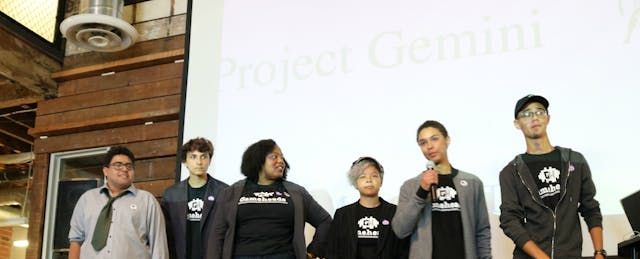Kai Drayton-Yee says she didn’t play too many video games when she was a kid, and focused more on “STEM and engineering and math.”
But this past Saturday, the 18-year-old was standing on a stage at Impact Hub in Oakland, describing a video game she’d worked on. She was one of approximately four dozen students who are a part of Gameheads, which bills itself as a tech justice organization aimed at teaching low-income and underrepresented young people the skills they need to succeed in the tech industry through video games.
Drayton-Yee was the project manager and lead artist for Gemini, a video game she describes as a “top-down, corporate thriller stealth puzzle game” in which a mailroom worker reads a classified letter and learns his company is in trouble. Wanting to find out more, the character sneaks around, looking for data on servers, “trying to figure out what the deal is.”
A freshman at the University of Southern California’s Interactive Media & Games Division, Drayton-Yee says her team wanted to explore the kind of choices players make when they “can make an aggressive choice or a passive choice, or a choice that will affect the world around them, and see how they want to move through a space.”
Other games student groups presented on Saturday included Remy, which is about a young girl’s first day at her new school, and Nobody’s Home, which is about a teen trying to overcome mental health issues.
Students have grown their skills at Gameheads, accomplishing things like getting into the University of California, Merced’s computer science program.

The Journey
Damon Packwood, the executive director and a co-founder of Gameheads, says he came up with the idea for the organization several years ago when he was playing Little Big Planet. Seeing that the game allowed players to create their own levels, “I said, wow, this would be really cool, if I can have students create a level about their life, their experiences, their culture,” he explains.
He says at the time, he was doing youth work for a different organization, and noticed the students there were “starting to become really tech and media savvy.”
“I remember that it was changing the way they processed information and as an educator, I started to feel like what I was teaching was outdated,” he says.
Packwood ended up becoming fascinated with the games business, and says he quit his job for a journalism internship so he could “infiltrate the industry.” And later, the tech diversity movement “blew up” in Oakland.
“People were focusing on web design, and Python, and everybody was like, code, teach them how to code, code, code, code,” says the Oakland resident. But he was curious as to why few of these efforts focused on video games. He says students of color and low-income students grow up playing video games; as part of their culture, he was “convinced” it would be “an easy way to teach tech.”
One day, Packwood says, he was trying to convince some students to do work. He says they wanted to look at video games on their phones, and he told them he’d teach them about video games if they did their work.
He kept his promise, and it became a weekly thing where he would meet with a group of students. He asked them to make a game in Little Big Planet. About six weeks later, he told them to create a game and “build it to Little Big Planet.” The result was a video game on grief. The students submitted that game to a White House competition, and won. One of the students was flown to the White House to present to Congress and the National Hispanic Congress. Gameheads officially began about two years ago.
“And since then, we've been slowly sort of building the program,” Packwood says.

The Program
The technology industry—and gaming, in particular—have in recent history stirred criticism for providing few opportunities for women or people of color. For Packwood, Gameheads offers an opportunity to showcase how local grassroots efforts can be a part of the solution.
Packwood says eventually video game companies will see that the students in Gameheads, who are their target demographic, “might be playing their video games, but they’re not making their video games.” He says the students are creating video games these companies aren’t making.
Gameheads has a middle-school program that operates after school, as well as a “classic” program aimed at older students. Students in the latter program meet six hours a week every Saturday, taking courses on subjects like game design and basic and intermediate programming. In June, they form teams and take on professional roles, like game designer and programmer. Then they have to come up with a concept for a video game.
Once a panel of judges approves their pitches, they then work 24 hours a week from June to the last week of August, developing their video games for the showcase. But it’s not over then, either. The fall is spent polishing the games, with the goal to distribute them. The games are not monetized “at the moment,” Packwood says, but adds that Gameheads plans on test running a monetization opportunity with one of the games.
Packwood says Gameheads “absolutely” wants to see video games incorporated into school curriculums. For instance, he says students could use their phones to play a game related to the subject matter of the class they’re taking. Packwood says the organization did a project that was part of a grant with the California Endowment addressing this very goal. “Our intention behind it was to attach curriculum to the subject matter of the games,” he says.
As far as incorporating video game design itself into the K-12 curriculum, Packwood says teaching that subject for “an hour or an hour-and-a-half a day” in a high school setting would be challenging—yet rewarding.



